Anti-LGBT Facebook Posts Proliferate in Georgia Before Tbilisi Pride
A group of Facebook pages is spreading anti-LGBT narratives as Georgia’s first-ever pride event draws near
Anti-LGBT Facebook Posts Proliferate in Georgia Before Tbilisi Pride
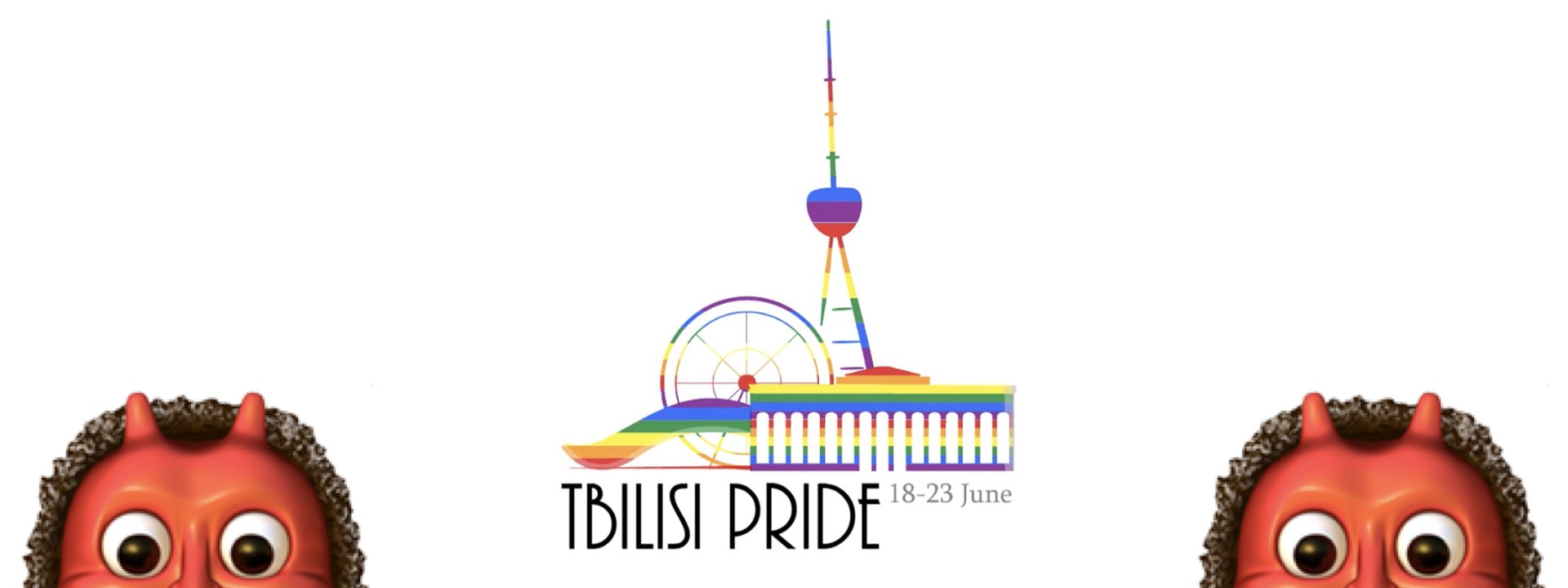
BANNER: (Source: @EtoBuziashvili/DFRLab via OC Media)
A number of Georgian anti-Western and far-right Facebook pages began to disseminate anti-LGBT content, following the announcement of Georgia’s first-ever large-scale pride event, Tbilisi Pride, set to take place June 18–23, 2019.
LGBT people often face rampant homophobia, violence, and discrimination in traditionally conservative countries such as Georgia. In 2018, LGBT rights activists cancelled a series of planned rallies in Tbilisi following threats from several Georgian anti-LGBT groups.
According to the Tbilisi Pride organizers, the event intends to shed some light on the difficulties the LGBT community faces in Georgia and hopes to provide a positive platform for them. June is celebrated around the world as LGBT Pride Month in commemoration of the 1969 Stonewall riots, when the New York City LGBT community demonstrated against police raids on the Stonewall Inn, a popular gay bar in the city.
On May 17, 2013, the International Day Against Homophobia, Transphobia, and Biphobia, a small group of LGBT rights demonstrators in Tbilisi were confronted by thousands of counter-protesters led by a group of Georgian Orthodox priests. The counter-protesters carried signs with homophobic messages, including some that compared the activists to “Sodom and Gomorrah,” a reference to a Bible story that is often weaponized against members of the LGBT community. The counter-protesters, many of whom carried improvised weapons, attacked the activists, forcing the police to evacuate the LGBT demonstrators out of concern for their safety.
Facebook Pages Spreading Anti-LGBT Narratives
In the first week of March, shortly after the organizers announced their plans for the event, anti-LGBT narratives started to proliferate on a number of Georgian far-right Facebook pages. In most cases, the posts and narratives shared by these pages were identical to one another. They demonized the West and liberal democracy, as well as presented the LGBT community as a threat to Georgia.
One such page, run by far-right group Georgian March — which Transparency International Georgia has identified as a Neo-Nazi organization — threatened to sabotage Tbilisi Pride 2019, stating in a Facebook video that the only way “the celebration of perversion” would take place would be for the LGBT activists to “march over Georgian March’s dead bodies.”

Five other anonymous pages had less direct associations with real-life groups but nevertheless posted anti-LGBT content frequently.
The first of the five, “კარდჰუ” (“Kardhu”), largely shared anti-Western content since its creation in 2017 but started to spread specifically anti-LGBT narratives in mid-March. As of the time of this analysis, Kardhu’s page had a sizeable audience relative to Georgia of 26,827 followers.
Posts by the Kardhu page highlighted Poland’s ban on same-sex marriage and claimed that, in Germany, after a woman said that there are only two genders, she provoked “mass hysteria from singled-cell liberals.” (The term “single-celled liberal” is employed by pro-Kremlin actors to disparage progressive activists in the West.)

The second of the five anti-LGBT pages, “Antiliberal League — ანტილიბერალური ლიგა,” was created on March 18, 2019, and had 177 followers at the time of this analysis. The first post it shared was a meme featuring an anti-LGBT narrative.
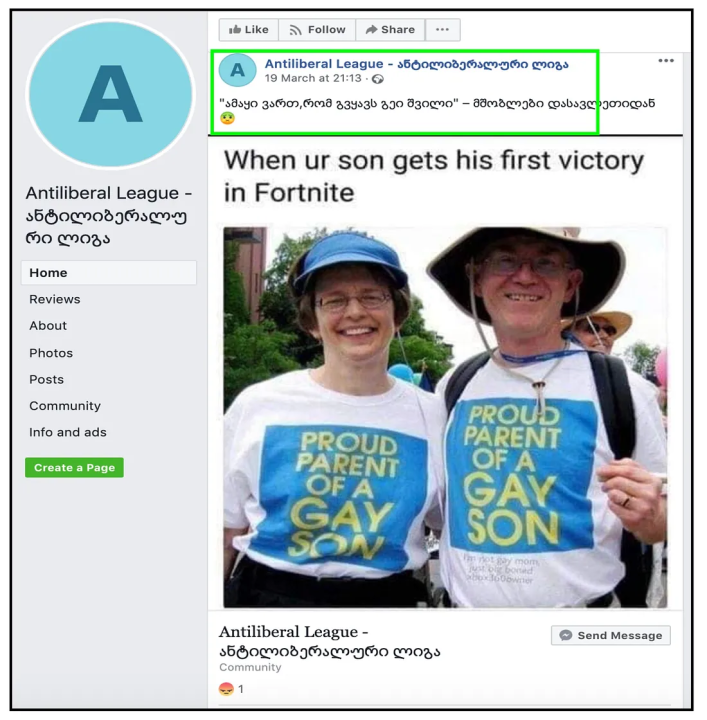
Yet another Georgian Facebook page, “ალტ-ინფო” (Alt-Info), identified itself as the source for “alternative information” and had 12,858 followers at the time of analysis.
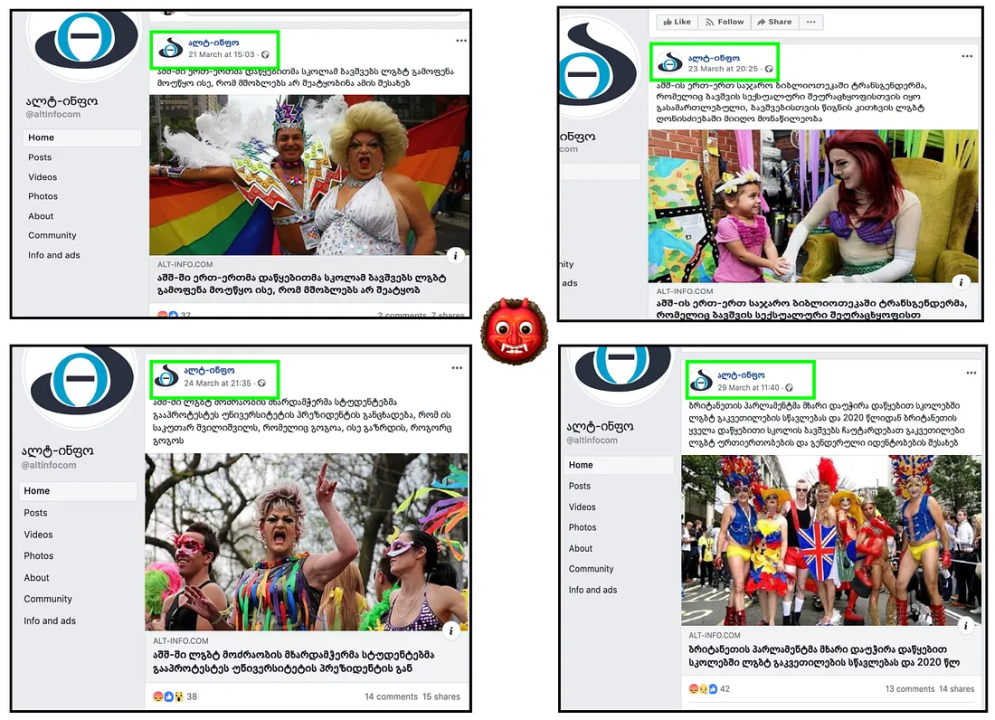
A fourth page, the anti-Western and far-right “იაზროვნე” (“Think”), which had 12,030 followers at the time of analysis, similarly shared anti-LGBT narratives.
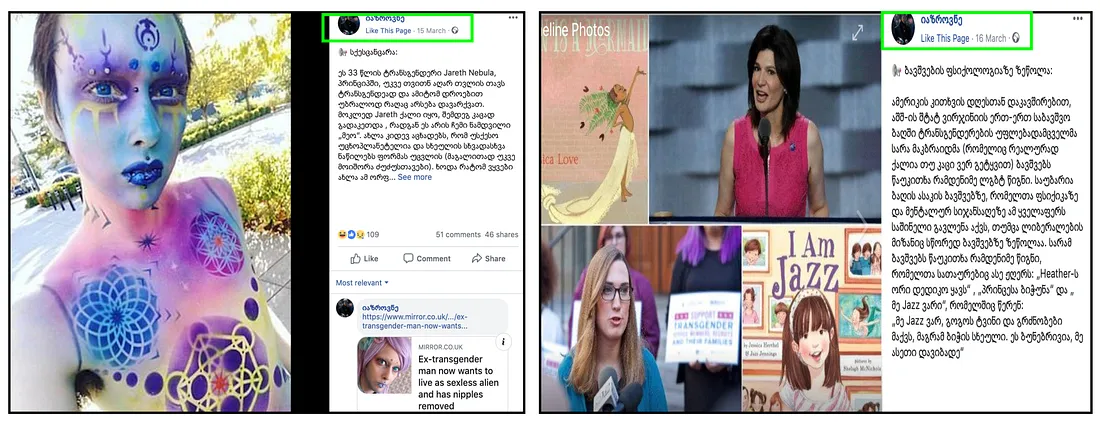
The fifth page, “ანტილიბერალური კლუბი” (“Anti-Liberal Club”) had 50,724 followers and also spread anti-LGBT messages beginning in mid-March, focusing on portraying the United States in particular as overly permissive in relation to LGBT rights.

Possible Coordination Between the Pages
In a number of cases, the five pages shared identical anti-LGBT content, a sign of possible coordination. There was insufficient evidence, however, to prove that the posts were indeed coordinated, especially given the difference in time between the posts. In many cases, the five pages shared articles published by the Georgian website alt-info, which publishes mostly anti-Western articles.


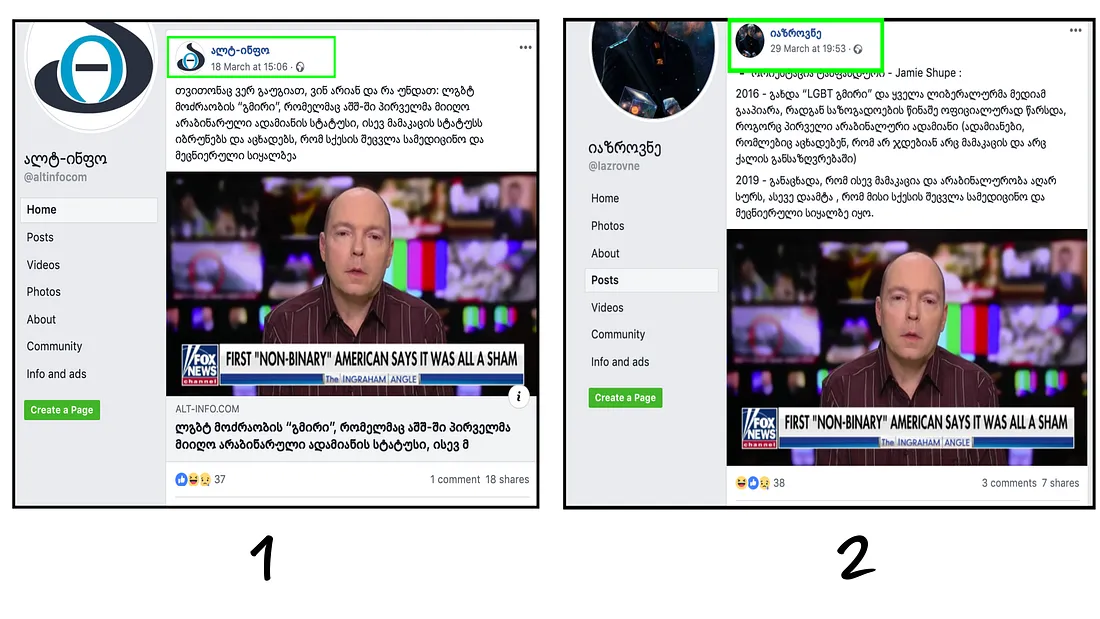
Sourcing the Facebook Pages
Four out of the five anonymous Facebook pages spreading anti-LGBT narratives were created in 2017–2018, and their page information sections list the page managers’ primary location as Georgia. The fifth Facebook account, ანტილიბერალური კლუბი” (“Anti-Liberal Club”), was created in 2015 and has nine page managers from Georgia and one from Russia.


All of the five Facebook accounts started to share identical anti-LGBT narratives and posts almost simultaneously in mid-March 2019, suggesting that they likely engaged in coordinated activity. In some cases, they reposted pictures and other content from one another and, in many cases, shared identical content. In addition to spreading anti-LGBT narratives among Georgian Facebook users, all of these Facebook pages shared xenophobic and racist posts as well.

An analysis using the social media monitoring tool CrowdTangle revealed that for three of the five pages, the number of page likes increased by several orders of magnitude between January and April 2019, with Kardhu increasing by more than 1,700, Alt-Info by 4,500, and Anti-Liberal Club by 522. If this rate of growth continues, the pages may have significantly increased their audience engagement by Tbilisi Pride Week.
CrowdTangle could not track the activity of the remaining two Facebook pages (Antiliberal League and Think), however, as they had not been indexed by it.

Conclusion
In March 2019, a number of Georgian anti-Western and far-right Facebook pages shared anti-LGBT narratives that demonized the West and portrayed the LGBT community as a threat to Georgia. The Facebook pages shared identical posts almost simultaneously, suggesting that there was likely some degree of coordinated activity.
The anti-Western Facebook pages started to spread their messages actively after the Tbilisi Pride organizers announced the dates of the 2019 event. Given that LGBT issues have sparked public outrage in Georgia before, the Facebook pages’ likely aim in renewing anti-LGBT messages was to fuel and amplify negative reactions among the public. In doing so, the pages contributed to increased polarization and mass hysteria regarding LGBT issues.
The Georgian anti-Western Facebook pages, one of which featured a manager based in Russia, posted similar or identical content. The duplicative messaging, coupled with the observation that the pages often posted simultaneously, is evidence of an operation with some degree of coordination dedicated to stopping the pride event, as well as having a broader agenda of undermining Georgia’s Western integration by demonizing the West.
This wave of anti-Western narratives did not achieve much audience engagement during the period of analysis. Regardless, however, the operation still has ample time to amass an audience, with over a month to go until Georgia’s Tbilisi Pride Festival.
Register for the DFRLab’s upcoming 360/OS summit, to be held in London on June 20–21. Join us for two days of interactive sessions and join a growing network of #DigitalSherlocks fighting for facts worldwide!

